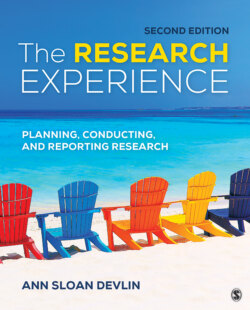Читать книгу The Research Experience - Ann Sloan Devlin - Страница 75
На сайте Литреса книга снята с продажи.
Open Access and Predatory Publishers
ОглавлениеIn your search for articles you may come across those published in what are called open-access journals. Open Access publishing refers to “unrestricted access and unrestricted reuse” according to the definition on the PLOS website (https://www.plos.org/open-access/). PLOS publishes several highly respected open-access journals primarily in the sciences, but there are open-access journals in every scholarly discipline; for example, Ergo is an open-access journal in philosophy. In the summer of 2019, there were more than 13,000 open-access journals listed in the Directory of Open Access Journals (https://doaj.org). In principle, the movement toward open access should provide numerous benefits, including faster publication of articles and availability of information. Many (but not all) open-access articles follow a rigorous peer-review procedure, which means there is a kind of gate-keeping to try to ensure the quality of the publication. These journals are free to the reader, but there may be costs associated with the publication of these journals, many passed on to authors.
Open-access journals: Journals that offer free access to the published articles.
Not all open-access journals are created equal. Jeffrey Beall, who at the time was a tenured librarian at the University of Colorado, Denver, established a blog titled Scholarly Open Access; a cached version of this information, which provides a critical evaluation of open-access publishing, is currently available as “Beall’s List of Predatory Journals and Publishers” (https://beallslist.net). The site provides coverage from 2012–2017 and is updated in a separate section, which leaves Beall’s original list intact. Beall no longer maintains the list himself because of pressure he states he felt from his employer and fears for his job (Beall, 2017). The disclaimer section of the current website (now on an independent server) states that the site is currently maintained by a postdoctoral researcher in a European university (https://beallslist.net/contact/) who prefers to remain anonymous for reasons similar to those Beall mentioned.
On his original site, Beall maintained a list of what he called Potential, Possible, or Probable Predatory Open-Access Publishers, often referred to as Beall’s List. Criteria for identifying predatory open-access publishers were also provided on Beall’s website and included such characteristics as evidence “showing that the editor and/or review board members do not possess academic expertise to reasonably qualify them to be publication gatekeepers in the journal’s field.” The cached version of Beall’s website contains a link to Beall’s criteria (https://beallslist.weebly.com/uploads/3/0/9/5/30958339/criteria-2015.pdf). This cached site also recommends consulting a website called Think.Check.Submit, the aim of which is to “educate researchers, promote integrity, and build trust in credible research and publications” (https://thinkchecksubmit.org/).
Beall’s List: List evaluating open-access publications in terms of their standards; named after the originator of the list, Jeffrey Beall.
Frequently there are fees charged to authors to publish in these predatory journals (called the author-pays model); at one time, book publishers that charged authors to publish their books were called vanity publishers.
In 2011, Beall’s list of Potential, Possible, or Probable Predatory Open-Access Publishers included 18 such publishers; in 2016, that number had reached 923. Beall had also started two new lists: one that included journals whose metrics (regarding calculation of impact factors) are suspect, the other identifying what he called hijacked journals, where the name of a legitimate journal has been hijacked by a counterfeit one.
It is probably prudent to stick with Google Scholar or one of your institution’s databases, to decrease the probability that you will end up with an article from a journal on Beall’s List. A useful overview of the problems surrounding open access publishing and the pressure to publish is an essay titled “Anarchy and Commercialism” by Altbach and Rapple (2012, March 8) from Inside HigherEd (https://www.insidehighered.com/views/2012/03/08/essay-problems-state-journal-publishing).
